If you've tried one acid, you've tried them all, right? Not so fast. Skincare aisles feature a diverse range of mild natural acids that are perfect for gently exfoliating the skin and fighting breakouts.
Neutrogena® utilizes derm-grade alpha hydroxy acids (AHAs), beta hydroxy acids (BHAs) and poly hydroxy acids (PHAs). While they all work in a similar way, different acids bring their own unique perks to the table.
If you're wondering what acid is good for acne-prone skin, look no further than this breakdown of common acids.
Alpha Hydroxy Acids in Skincare
AHAs are derived primarily from plants. Deemed one of the best categories of acids good for acne-prone skin, there are seven types of AHAs commonly used in skincare — citric acid from citrus fruits, glycolic acid from sugar cane, hydroxycaproic acid from royal jelly, hydroxycaprylic acid from animals, lactic acid from lactose, malic acid from fruits like apples and tartaric acid from fruits such as grapes. While all AHAs have mild exfoliating properties, research suggests that glycolic and lactic acids are the least likely of the AHAs to cause skin irritation, even with long-term use.
Exfoliation can reduce the appearance of post-acne marks by clearing away dry, dead skin, and excess sebum that sit on the skin's surface. A study by Cornell University Medical College found that AHAs disrupt the substances that adhere to the skin's surface, shedding away dead skin and other pore-clogging materials. Consider opting for a cleanser, exfoliator, serum, moisturizer or toner featuring AHAs to help acne-prone, mature and dry skin types feel their best.
Beta Hydroxy Acids (Salicylic Acid) for Skin
BHAs may appear on skincare product labels as salicylic acid, beta hydroxybutanoic acid, tropic acid or trethocanic acid. As with AHAs, BHAs act as exfoliants on the skin: They break down the substance that adheres debris and sebum to the skin, minimizing the appearance of acne and clogged pores in the process.
Salicylic acid can come from natural plant sources. You'll most commonly find it in acne cleansers, toners and lotions targeted toward those with acne, blackheads and whiteheads. However, keep in mind that BHAs can make skin feel dry and exacerbate dry, sensitive or eczema-prone complexions.
Poly Hydroxy Acids
PHAs tend to run a little more under the radar than their AHA and BHA counterparts. Like AHAs and BHAs, these acids work to loosen the bonds that hold the dead skin and sebum buildup accumulating on the skin.
PHA molecules are larger than AHA and BHA molecules, which means they have a harder time penetrating the skin's surface. As a result, they're typically gentle on skin. Gentle doesn't mean ineffective, though — PHAs' natural exfoliation makes them a prime ingredient for tackling acne-prone skin. PHAs ward off the visible effects of environmental stressors and help to improve the appearance of clogged pores. You may see PHAs show up in cleansers and toners as gluconolactone, lactobionic acid or galactose.
Acid that's good for your friend may not work the same way for you. Even with the mildest acids, build up your routine slowly to see how your skin reacts — and wait for your chosen acid's gentle exfoliation to reveal clear, comfortable skin.











